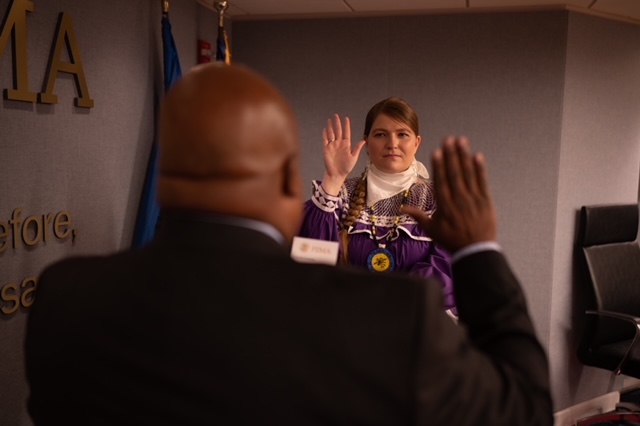
- Details
- By Native News Online Staff
WASHINGTON – Following the release of its first-ever National Tribal Strategy in August, the Federal Emergency Management Agency (FEMA) has appointed the agency’s first National Tribal Affairs Advocate, Native News Online has learned.
Kelbie Kennedy, a citizen of the Choctaw Nation of Oklahoma, was sworn in yesterday and will be formally announced later today as the first tribal political appointee in FEMA history. Kennedy will advise the agency and its Administrator on tribal affairs, while working to ensure that FEMA lives up to its treaty and trust responsibilities to tribal nations.
“Tribal Nations and communities deserve to have their voices heard, especially when it comes to preparing for, responding to, and recovering from disasters,” FEMA Administrator Deanne Criswell said in a prepared statement. “Ms. Kennedy has spent her career working on issues related to tribal emergency management and resilience, homeland security, and public safety. FEMA and the Biden-Harris Administration will benefit greatly from her compassion and competence.
“I am confident that Ms. Kennedy will be a key advocate for Indian Country given her extensive experience representing their interests and priorities, as well as her lived experience as a citizen of the Choctaw Nation of Oklahoma,” Criswell added.
Prior to joining FEMA, Kennedy worked for more than four years as the policy manager for national security and community safety initiatives for the National Congress of American Indians (NCAI). In her role at NCAI, she worked on national policy issues surrounding tribal emergency management and resilience, tribal homeland security, tribal border issues, violence against American Indian and Alaska Native women, public safety and justice, Missing and Murdered Indigenous Women, and international Indigenous rights.
Kennedy also played a pivotal role in the effort to reauthorize the Violence Against Women Act earlier this year, restoring tribal nations’ criminal jurisdiction over certain crimes.
“I am honored to be the first tribal political appointee in FEMA history and will work hard to ensure that Tribal Nations and tribal sovereignty are at the forefront of our efforts,” Kennedy said in a statement. “Growing up on my Tribal Nation’s reservation in Southeastern Oklahoma, I learned firsthand that Tribal Nations are the first—and many times the only—line of defense when disaster strikes Indian Country. When Tribal Nations have the necessary resources and support they need, the entire community is better prepared and able to respond to disasters.”
Choctaw Nation Chief Gary Batton praised Kennedy and her appointment to FEMA.
“Kelbie’s commitment to Indian Country and all Tribal Nations is next to none. Over the course of her illustrious career, she has helped ensure that Tribal Nations have a seat at the table, and her appointment to serve as the first National Tribal Affairs Advocate is a continuation of that noble effort,” Batton said in a statement. “We are so proud of everything Kelbie has done and will continue to do on behalf of Indian Country, and we look forward to seeing her continued efforts to make sure that Indian Country is ready when disaster strikes.”
Kennedy was born and raised on the Choctaw Nation’s reservation in southeast Oklahoma. She received her J.D. and certificate in American Indian Law from the University of Oklahoma, College of Law.
Reporter Neely Bardwell contributed to this story.
More Stories Like This
Native News Weekly (August 25, 2024): D.C. BriefsUS Presidents in Their Own Words Concerning American Indians
Native News Weekly (January 18, 2026): D.C. Briefs
Federal Judge Orders ICE to Halt Use of Pepper Spray, Arrests of Peaceful Protesters in Twin Cities
Tunica-Biloxi Cultural Leader John D. Barbry Walks On
Help us defend tribal sovereignty.
At Native News Online, our mission is rooted in telling the stories that strengthen sovereignty and uplift Indigenous voices — not just at year’s end, but every single day.
Because of your generosity last year, we were able to keep our reporters on the ground in tribal communities, at national gatherings and in the halls of Congress — covering the issues that matter most to Indian Country: sovereignty, culture, education, health and economic opportunity.
That support sustained us through a tough year in 2025. Now, as we look to the year ahead, we need your help right now to ensure warrior journalism remains strong — reporting that defends tribal sovereignty, amplifies Native truth, and holds power accountable.
 The stakes couldn't be higher. Your support keeps Native voices heard, Native stories told and Native sovereignty defended.
The stakes couldn't be higher. Your support keeps Native voices heard, Native stories told and Native sovereignty defended.
Stand with Warrior Journalism today.
Levi Rickert (Potawatomi), Editor & Publisher


